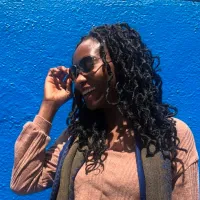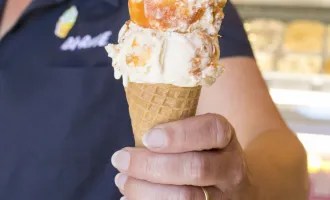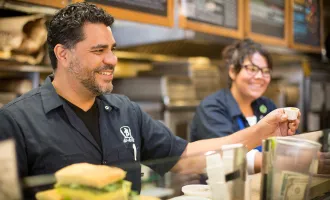
Meet Bi-Rite, the Green Market, Part One
Thanksgiving is almost upon us, bringing a warm reminder of friendly neighbors and the earth’s bounty. And, indeed, every day is worth giving a little gratitude to Mother Earth.
You likely have become aware of this fact living in San Francisco: The city has been ranked the #1 greenest US city, being consistently cited as an “environmental pioneer.” In addition to being the first city to ban plastic bags, San Francisco recycles more than 75% of all municipal waste (!!). In fact, the amount of waste diverted annually comes in at more than double the weight of the Golden Gate bridge. San Francisco’s success as a green city represents a remarkable feat of engineering: it’s a fine balance of transport initiatives, urban green spaces, climate-friendly policies, and sustainable distribution outlets.
Certified Green Businesses are vital in providing both consumers and businesses with products or services to help reduce their environmental footprint. To help conscious consumers, California’s certified green business directory created an app called “Shop Green-Business Search,” which enables users to locate sustainable businesses in the area and filter by category: Shopping and Retail, Entertainment, Lodging, Food Service, Catering and Groceries, etc.
While many non- Green Certified businesses are working towards sustainability, Certified Green businesses are really leading the charge. There are under 40 certified green food/catering businesses in San Francisco, and only a handful have multiple locations of operation. The Bi-Rite Family of Business, which includes two Markets, a Catering Commissary, and a Creamery, is one of these pioneers.
To learn more about Bi-Rite’s unique role in the food ecosystem, I spoke with Rachel Kiichli (RK), The Senior Marketing + Community Manager for the Bi-Rite Family of Businesses.
RR: Hey, Rachel! It’s a pleasure to have the opportunity to speak with you. To start us off, can you tell us a little bit more about yourself, how you got involved with Bi-Rite and Bi-Rite’s Mission?
RK: My name is Rachel Kiichli. I come from a nonprofit background. I was running a nonprofit called Bay Leaf Kitchen with a really incredible woman in San Francisco for a number of years. As an organization, our goal was to combat food insecurity. We had after-school programs and summer camps that paired SF chefs together with young groups of people, starting all the way down at little chefs. I came to Bi-Rite because I was looking for a new way to stretch myself with a values-aligned company. Bi-Rite seemed like a perfect fit, and I’ve now been with the company for three years.
I am the Senior Marketing and Community Manager for the Bi-Rite family of businesses, so I have the incredible job of getting to work with all of our marketing initiatives. I get to create all of our social media and email campaigns, our community programs, our seasonal programs at the markets, manage our philanthropy, our Green Business status, and work on our B Corp status. I really get to get involved with anything in the company that touches our community, which we define as our internal community (our staff), our immediate community (our neighborhoods), and our global community (the planet). It’s a tremendous and amazing job that I get to do, and I love my work every single day.
RR: That’s great to hear, Rachel. So, could you tell me a little bit more about what it means to be a Green Business? What sort of standards do you have to uphold?
RK: Sure. The Green Business Certification and their guidelines, they do change every single year. Each of our businesses regularly goes through the recertification process to make sure that we are compliant with all applicable environmental regulations.
The City of San Francisco and the Department of the Environment do a really incredible job. The Department of the Environment staff that work on the Green Business Certification are so helpful— they want businesses to succeed as Certified Green Businesses. It’s really somebody, a staff member there reaching out and managing this relationship and sticking with you. That kind of support is really helpful.
RR: Wow. That’s awesome to have someone to make sure you’re supported in this manner. Could you speak to the Product Mission and Sourcing Guidelines?
RK: We have these really talented people—called ‘Category Sales Managers’—who are responsible for making sure that all of the products that are on our shelves or in our markets are aligned with our product missions.
Our goal with anything that we’re purchasing or anything that we’re putting on our shelves is to create relationships with our partners, farmers, producers, everyone. So, we spend a lot of time and energy making sure that we’re making good choices. We have direct farm relationships with a lot of our produce growers. You know, the difference between us and maybe a different type of retailer might be that they would go through a distribution company, right? So, we do, every once-in-a-while go through a distribution companies that we believe in, that we trust, and that are sourcing along our same guidelines, but for the most part, we could have, you know, a hundred different produce items in the market, and, a huge number of them could be coming from individual farms.
RR: Oh wow.
RK: Yeah, and they’re being hand delivered sometimes via the farmers themselves who drive up in their trucks and they come in to the city from around 50 miles or so, and they’re delivering the flowers, the snap peas…the tomatoes, whatever it is.
It really is in support of this very local economy. You know, those farm-direct relationships have made it possible to work with farms when times are lean, when crops aren’t as good, to be able to support them through a season like that where maybe we can pre-buy when we know the crop will be better so they can have income they need and the time they need.
One of the things that we feel very strongly about is making sure that we are understanding and giving space for the true cost of food: food that is grown responsibly for the planet and for the workers, food that is grown sustainably, that isn’t on the backs of people or in lieu of environmental practices…
RR: It’s amazing. So many of the costs of production are externalized in food production, especially here in America. In America, actually it’s some of the cheapest prices for food for any country, and it largely is the environment and the workers paying the price.
RK: Indeed. We have become as a society, accustomed to having the fruits and vegetables that we want whenever we want them, regardless of whether they’re in season or not, we’ve become accustomed to the inexpensive, food that we are used to, and it’s—yeah. It’s kind of hard to reframe your mind and think, Why is it that cheap? Could I pay a little bit more if I knew that this farmer was being paid a fair wage and had a decent place to live? Or if I knew that it took a really long time to harvest this crop because they don’t use pesticides and they’re going through and hand-weeding everything? Or, they have to let entire fields go fallow because they need to plant a cover crop to reintroduce nitrogen into the soil during a season? So, you know, that’s something that we’re constantly evolving and working on, making sure that we’re able to provide food that’s as affordable as we possibly can make it while making sure that we’re not compromising on the land and the people that are growing our food.
RR: But, there’s really this community connection that you bring up, this idea of community health. It really just makes me think of the Omnivore’s Dilemma. There’s this quote, “Food is not just fuel. Food is about family, food is about community. Food is about identity, and we nourish all of these things when we eat well.” Could you speak a little bit more about that?
RK: Yes, so, as I said, our mission is creating community through food, so we agree: food is about identity, food is about family, food is about sharing and cooking together. And, of course, food is about access, so in addition to wanting the best possible foods that are grown, the best possible way [to be] produced, the best possible way to be in our markets, we understand that being able to purchase food at some common prices that we have in the Bay Area can be an actual—um, what’s the word I’m looking for?
RR: Barrier?
RK: I don’t want to say barrier… It’s a privilege. So, you know, we, again, going back to this food as community and our responsibility to our global community and our communities surrounding where our businesses operate, we work really hard to give back in a way that will make it possible for everybody to get access to good food whether it’s with us or elsewhere.
RK: So, we have these wonderful relationships with Heart of the City Farmer’s Market and Mission Community Market. There’s this program called Market Match. We contribute to funding at each of those two markets, which basically gives any person using EBT a two-for-one dollar-for-dollar match, where if they’re buying produce at a farmer’s market. So, if I have EBT and I go to this tent, I can say, I’m going to spend $50 today and then get $100 worth of tokens back to be able to purchase fresh fruits and vegetables at a farmer’s market.
It makes a dollar stretch farther and incentivizes someone to eat fresh food, and local food. So, to that point and going back to Michael Pollan again: food is not something that happens in a vacuum. In a time like COVID, where it’s so many things, where so many people are living insular lives with maybe just themselves and their immediate family, it’s maybe hard to imagine how that can happen, but there are these programs out there in the world making it possible for people to continue to continue to grow their community and continue to grow their food literacy.
RR: That’s amazing. The one last question that I’ll ask you is what are some ways readers can have a taste of the community and contribute, other than stopping by? *laughs* The most obvious thing, is run out, get some fresh produce.
RK: Sure. Well, if it is about wanting to get your paws on something that we have at the market, but maybe coming in to the market isn’t doable for you, we do have online ordering, so if you go to BiRiteMarket.com, and click on “Shop Now,” you can get groceries delivered, or if you are, because of COVID, not going into stores still but would like a treat from Bi-Rite, you can order ahead and they’ll bring it out to you to the curb.
Also, we actually have a Certified Delicious Guarantee, so, if you purchase something and you get it home, and you try it, and you didn’t like it, you e-mail us, and you let us know, and we will figure out a way to make it right. Either we’ll replace it, or we’ll get you something else that we hope you’ll like better.
RR: I just love the idea of a Certified Delicious *starts laughing* It’s so great! It’s like, wholesome food is healthy in every way!
RK: Yeah. Also, if you would like to get involved in terms of being able to donate to an organization, if you go to our Community page, you can read about some of the organizations we support, and click right through to their sites, if you’d like to make a direct donation.
And then, beyond that, if you just have more questions in general, if you want to learn more about Bi-Rite and who we are, and why we believe the things we do, why creating community through food is so important to us, I encourage you to reach out. You can always email me at communitymarket@birite.com, or you can email our market staff at guestservice@birite.com. And, of course, reach out to us on Instagram, DM us, say you read this interview and you had a question!




